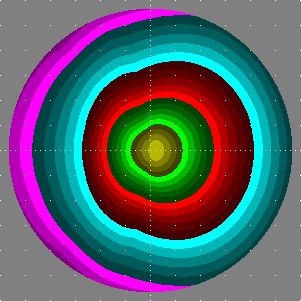


|

|
| In the left half of the left plot, specific illuminance by a continuous row of luminaires spaced 5 heights is shown (right half is for a single luminaire). | The right plot is for a single luminaire, unrotated. |

Values below the scale are illuminance / 1 lx. This is for (unrealistic) “unit” case that luminaires would have lamps producing 1 klm only, would be point-like and just 1 m over the terrain.
# [MANUFAC] .hess
# [TEST] NO26-06R
# [LUMINAIRE] NOVARA L
# [LUMCAT] 12.72600.0
# [DATE] 22.12.03/09.04.1997/fg |22.12.03 LUMCat
# down given: 100%
# out given: 39.7%
# tilt: 0.0
# [LAMP] TC-DEL 26W
# Source file: ldt/N2606rbi.ldt
# Luminaire flux = 393 raw, for the given bulb(s) it would be 707 lm,
# 39.3 % of the bulb flux
# between 75 and 90: 0.0 % of the luminaire flux
# - this part causes just GLARE in case of road lighting and similar purposes
# 80deg and above: max 7.8 cd / 1000 lm , 0.2 % of the luminaire flux
# 90deg and above: max 0.6?cd / 1000 lm , 0.0?% of the luminaire flux
# CutOff Type: CIE_CutOff
# Increase of Sky Luminance due to light going
# from the luminaire difectly above horizon, as compared with the
# luminance produced by the light dispersed from the ground: 0?%
# Increase of Sky Luminance in Distant Places by light below 15.0 degrees
# due to light going from the luminaire directly above horizon: 0?%
# (for the zenith luminance such an angle suits places up to 19 km distance)
# The increases concern the following situation:
# Albedo = 0.10
# Zenith Extinction = 0.30 mag (i.e., direct light remaining 76 %)
# Indicatrix type =0 (0: acc. to P.Cinzano, 4..6: CIE sky types)
# (the downward-scattered part of lambertian uplight is 0.1108 then)
# 62.5 deg to <67.5 deg: max -99 cd / 1000 lm,
# 67.5 deg to < 76 deg: max 58 cd / 1000 lm,
# maximum spec. lum. intensity 202 cd / 1000 lm
# The following table gives luminous intensities which would be produced
# using a hypothetic bulb giving a luminous flux of 1000 lm (i.e., cd/klm):
# H: 0.0 10.0 20.0 30.0 40.0 50.0 60.0 70.0 80.0 90.0 100.0 110.0 120.0 130.0 140.0 150.0 160.0 170.0 180.0
#V:
0.0 156 156 156 156 156 156 156 156 156 156 156 156 156 156 156 156 156 156 156
10.0 202 201 198 197 192 187 180 170 160 153 126 124 121 120 121 119 119 119 124
20.0 201 200 198 198 193 187 178 167 154 143 116 111 106 102 99.7 96.8 96.0 94.7 98.6
30.0 186 186 185 182 179 174 167 155 141 126 101 93.2 87.1 83.2 79.3 76.3 76.2 75.4 79.1
40.0 170 169 168 165 159 151 143 133 118 103 80.1 72.4 66.8 64.7 64.2 64.2 64.5 63.9 67.1
50.0 143 144 143 140 132 123 113 102 90.0 75.4 56.4 50.8 48.0 50.0 50.5 48.9 47.5 46.8 47.8
60.0 110 109 108 104 95.0 87.9 77.8 67.0 56.4 45.6 33.6 31.2 32.9 32.5 30.8 29.3 27.5 26.8 26.4
70.0 56.5 56.0 57.8 55.8 52.7 47.5 40.3 33.5 26.1 19.8 15.2 16.3 14.8 13.3 10.9 9.6 8.3 7.9 7.8
80.0 6.9 6.8 6.9 7.2 7.7 7.8 7.7 6.3 4.8 3.7 3.2 2.8 2.1 1.6 2.0 2.2 2.3 2.5 2.6
90.0 0.4 0.4 0.4 0.4 0.4 0.4 0.4 0.4 0.4 0.4 0.4 0.4 0.4 0.4 0.6 0.6 0.6 0.6 0.6